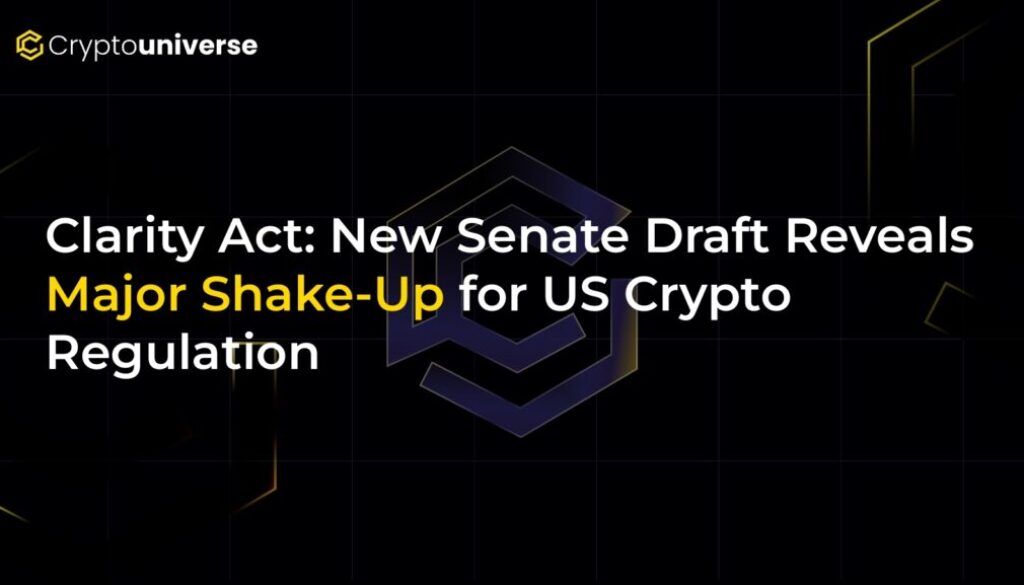Clarity Act: New Senate Draft Reveals Major Shake-Up for US Crypto Regulation

The Future of Crypto in America Takes Shape as Senate Unveils New Bill
The long-awaited regulatory clarity for the U.S. cryptocurrency market is inching closer to reality. A new, more detailed draft of a landmark crypto bill has begun circulating privately within the Senate, signaling a significant step forward in establishing clear rules for the digital asset industry. This Senate version, building on the momentum of the House-passed Clarity Act, introduces crucial new provisions for developer protections, bankruptcy procedures, and the tokenization of real-world assets.
For years, the U.S. crypto ecosystem has been tangled in a web of uncertainty, largely defined by the ongoing jurisdictional squabble between the Securities and Exchange Commission (SEC) and the Commodity Futures Trading Commission (CFTC). This new legislation aims to finally end the era of “regulation by enforcement” and draw clear lines in the sand, potentially cementing America’s role as a leader in blockchain innovation.
What’s New in the Senate’s Crypto Bill?
While the House of Representatives celebrated a major bipartisan victory with its version of the
Unprecedented Protections for Developers
Perhaps the most celebrated update in the new draft is the inclusion of robust legal protections for software developers. The bill aims to shield individuals and entities involved in “developing, publishing, constituting, administering, maintaining or otherwise distributing” a distributed ledger or decentralized finance (DeFi) system.
This is a game-changer. It means developers who create and maintain the open-source code for decentralized networks would not be held liable for how others use that technology, a key concern that has cast a shadow over DeFi innovation.
Clarity in Crisis: New Bankruptcy Guidelines
The collapse of major crypto platforms left many customers wondering about the fate of their assets. The Senate bill directly addresses this by amending U.S. bankruptcy law. It introduces a concept of “ancillary assets” and clarifies that these assets, along with digital commodities held by a bankrupt firm, should be treated as customer property. This provision is designed to ensure that in the event of an insolvency, customer funds are prioritized and returned rather than being absorbed into the company’s estate to pay off creditors.
A Framework for Tokenization and Real-World Assets (RWAs)
The tokenization of real-world assets is one of the fastest-growing sectors in blockchain. The Senate draft tackles this head-on, proposing a collaborative approach:
- Joint SEC & CFTC Study: The bill mandates a joint study by the two agencies to develop standards for tokenized securities and other RWAs.
- Custodian Standards: This study will explore how third-party custodians should handle tokenized assets, creating a secure and reliable framework.
- No Automatic Reclassification: Crucially, the bill states that simply tokenizing a security does not change its status as a security. Likewise, tokenizing a real-world asset that isn’t a security does not automatically make it one.
The Political Gauntlet: House vs. Senate and the Path to Law
While this new draft is a major step, the road to becoming law is still complex. The House passed its
One of the core differences between the House and Senate approaches lies in how a digital asset can transition from a security (overseen by the SEC) to a commodity (overseen by the CFTC) once it becomes sufficiently decentralized. Resolving this is central to the entire legislative effort.
The legislative process from here involves several key stages:
- Markup Hearing: The Senate Banking Committee will review the bill, and senators can propose amendments.
- Senate Floor Vote: If it passes the committee, the bill goes to the full Senate for a vote, where it needs 60 supporters.
- Reconciliation: Once the Senate passes its version, it must be reconciled with the House’s bill to create a single, unified piece of legislation.
- Final Passage & Presidential Signature: The final bill must pass both chambers again before heading to the President’s desk to be signed into law.
Though initial deadlines have passed, lawmakers like Senator Cynthia Lummis are hopeful a bill can be signed by Thanksgiving, underscoring the high priority crypto regulation has become in Congress.
Why the Clarity Act Matters for Everyone in Crypto
The passage of a comprehensive market structure bill like the
By defining the roles of the SEC and CFTC and providing clear rules for developers and businesses, this legislation could unlock a new wave of growth and ensure that the next generation of financial innovation, from DeFi to DePIN and AI, happens on American soil.


